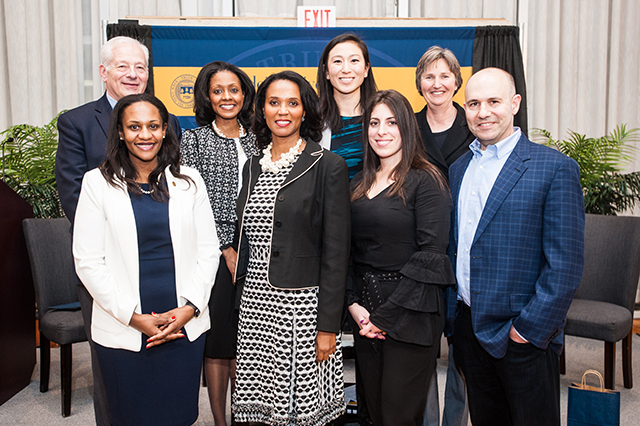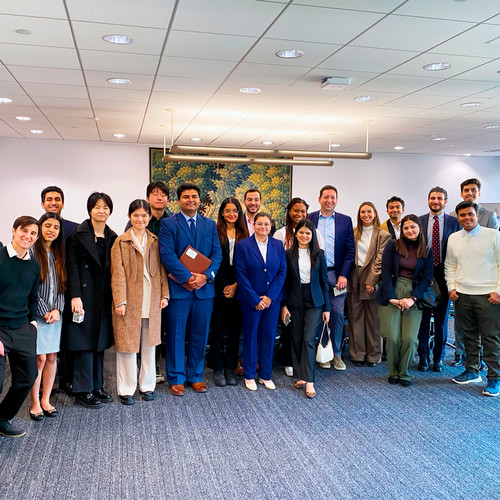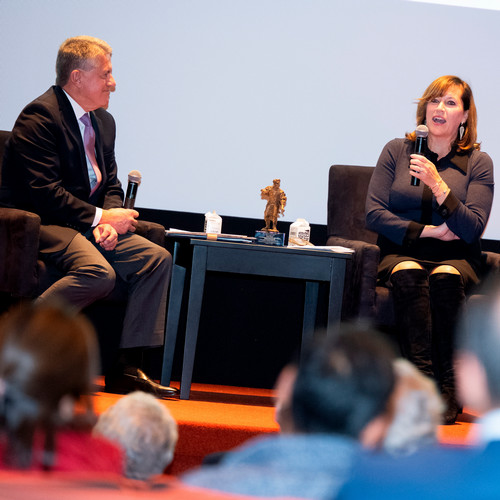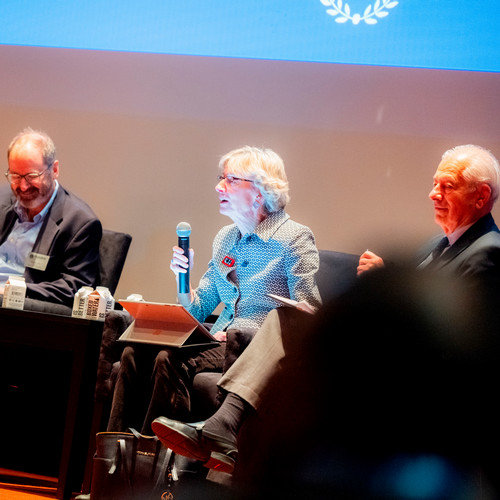
Women in the workplace address the unique barriers to success for female professionals
Last week in Rapaporte Treasure Hall at Brandeis University’s Goldfarb Library, men and women heard from a wide variety of female professionals about how they accelerated their careers in today's corporate world, using research-proven strategies. Check out video of the event here.
This event was co-hosted by Brandeis International Business School and the Perlmutter Institute for Global Business Leadership. Perlmutter Director and International Business School Professor of International Management and Organizational Behavior Andy Molinsky kicked off the evening by introducing Audrey Gallien, director of learning products and programs at the Catalyst Organization, the nation's leading think tank for accelerating progress for women in the workplace.
Catalyst, Gallien explained, researches career advancement strategies that have the highest payoffs for men and women. She noted that research has found people fall into four types by career advantage strategies: (1) Climbers, who look to advance inside their current organization; (2) Scanners, who look externally for opportunities; (3) Hedgers, who hedge their bets, looking internally and externally at the same rate, and (4) Coasters, who adopt career advancement strategies at random.
“We found that men tend to be scanners, because they're more highly compensated and rewarded for that behavior,” said Gallien. “Whereas women are rewarded as climbers, staying at an organization for a long time and ‘doing their time.’”
Ultimately, Gallien said, having a career strategy isn't about luck or about just putting your head down and doing the work, it's more nuanced than that.
“Be seen, take risks and ask for what you want.”
For example, another difference between the career trajectories of men and women is performance versus potential. Research shows that men are rewarded based on communicated potential, whereas women are rewarded for “proven performance.”
She used that research to urge women in the audience: “If you see a job you don't qualify for, you should apply. Put all of your effort into an amazing cover letter, talk about why you connect to the corporation’s business plan and where you see yourself in two or three years. But don’t get stuck thinking that if you can’t check off 10 out of 10 boxes, you can’t even apply. The sooner you get that out of your routine and mindset, the better you’ll get at talking about yourself in a creative way.”
Gallien also suggested that, as you strategize your career trajectory, you ask yourself the following questions: (1) What makes you unique? (2) What type of environment empowers you, and when do you feel like your best self? (3) What is your larger mission as a person? and (4) Do you talk about it?
Finally, Gallien explained the idea of a sponsor: “Mentors talk with you; sponsors talk about you, on your behalf, when you’re not in the room.” The difference is that sponsors provide opportunities that you may not have even known about yet, and that can dramatically accelerate a career. To find a sponsor, Gallien suggested, “Be seen, take risks and ask for what you want.”
After Gallien's presentation, Sava Berhané, adjunct professor at the business school and lecturer in women’s gender and sexuality studies, took the stage as moderator. She kicked off the panel discussion by bringing up another piece of research: women and men leave college with the same ambition for top jobs, but within two years, that confidence drops by 60 percent for women but only by 10 percent for men.
Ingrid Jacobs, corporate business diversity lead at Raytheon, answered the implied question: “Unfortunately, some women encounter career tracks that don't feel as welcoming, or like places where they can be their whole selves. That’s when some individuals start to self-select out. But I’d urge young women in that position to find a sponsor or mentor, find their internal fortitude and know they are just as good as everyone else.”
Julie Atonelli, manager of sales at Iron Mountain, spoke about a realization she had when she was years into her position: “I realized I needed to become my own brand. I work for a company but I’m still my own person. So I came to rely on LinkedIn, and whenever I met with my boss, I started the conversation by listing 10 of my recent accomplishments.”
Berhané also asked about the urgency some women feel to conform to stereotypes – to be seen as warm and not self-promotional. Alice Lin, engagement manager in strategic workforce planning at Liberty Mutual, had something to say about that. “My first two years out of college, I was working at a consulting firm. I kept my head down and got my work done, but I had no time to network or find a sponsor. I also didn't receive regular feedback,” she said. “Don’t be afraid to ask for feedback – you can use it to calibrate yourself, what you're doing right and what you can improve upon.”
Another question centered on failure. “How did you learn to embrace failure and strategize around it?” asked Berhané.
Charlene Kampert, manager of strategy and business intelligence at Liberty Mutual, had a response: “I consider myself to be a hard worker, but sometimes that's not enough. People need to know what it is you’re doing, and if people don't know, it doesn't matter.”
Ultimately, the event offered an enormous benefit to its audience. Students not only learned about research and modeling by the Catalyst Organization that will help accelerate their careers, but they also heard from world ready women who have found the right roles for them in the business world, through plenty of trial and error.
In addition to being co-hosted by Career Strategies Center and Office of Engagement and the Perlmutter Institute at the International Business School, this event was co-sponsored by four other Brandeis University organizations: the Office of Diversity, Equity and Inclusion; the Women's Gender and Sexuality Studies Program; the Hiatt Career Center; and the Center for Career and Professional Development in the Graduate School of Arts and Sciences.
Featured Stories
News Categories
@BrandeisBusiness Instagram
View this profile on InstagramBrandeis Intl. Business School (@brandeisbusiness) • Instagram photos and videos

December 14, 2023
New York City alumni offer career insights
November 1, 2023
Celebrating a role model for women in finance
October 30, 2023
Repairing the global economy